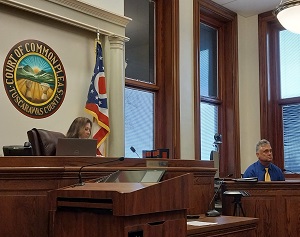
A bench trial is in the hands of Judge Elizabeth Thomakos related to a landlord registration fee in the City of Uhrichsville.
Thursday morning, attorney’s waived opening statements, but the case stems from the plaintiff’s arguments that the fee is an illegal tax because it is not solely used for landlord properties, and those who paid should be issued refunds.
The first ordinance was approved by city council in 2017, but was never enforced by the administration so money was not collected. Former mayor Mark Haney then took office and went to implement a code enforcement officer, but a hire was not completed for several years. In 2024, a new administration came in with Amy Myers appointed into the position until most recently Terry McFerren.
The first witness called by Attorney Matthew Onest is the owner of R and N Ventures, Randall Colaner. He stated that under his different properties, he has never paid under the ordinance.
“Have you seen a direct benefit, to you as a landlord, based upon the monies collected by this ordinance?”
“No.”
“And, ultimately, what is your goal with this lawsuit?”
“To get a judicial decision stating that it’s an illegal tax. Number two, all money collected, if the ruling does go that way, return to the people who paid it.”
This was the plaintiff’s only witness.
City Law Director Jeff Merklin began his case by calling on City Auditor Jeryl McGaffick, who testified that she came to work for the city at the start of the year and the landlord fee is placed in a specific line item.
“I don’t actually handle the money. It goes to the mayor’s secretary, and she makes the deposit and gives me the information and I put it on our system, and it is receipted in as a landlord registration fee. It has its only line item under the general fund.”
Other witnesses for the city included former mayor Haney and current Mayor Jim Zucal. Zucal noted that the code enforcement officer receives a complaint, looks at the property, and then coordinates to see if it is a rental or not. If yes, he takes care of the notice but if not, that task falls to the city’s service director.
In closing arguments, O’Nest emphasized that there is no boundary included in the ordinance.
“The city places the monies in its general fund but does not place any restrictions. There are no restrictions in place to tell anybody don’t spend it on this because it only needs to be for the landlords for the code enforcement. Regardless, the code enforcement officer works on non-landlord properties.”
Merklin argued the city is legal because roughly 68% of city homes are rentals.
“Things can be found constitutional or unconstitutional not only on the words that are used but how they’re applied and that’s what I want the court to focus on. In this particular case the city may not have done it perfectly, I’m not trying to say it has, but the implementation, how it’s actually happened is certainly constitutional and that’s what I want the court to focus on. The big picture.”
The judge will now review the testimony and submitted paper exhibits.
Copyright WTUZ Radio Inc., 2024